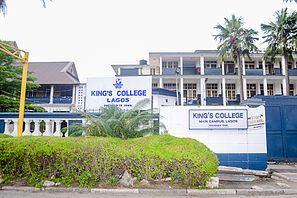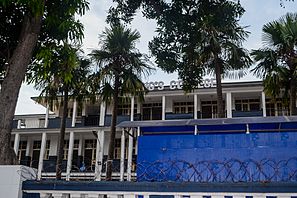King's College, Lagos
| King's College | |
|---|---|
 King's College, Lagos | |
| Address | |
 | |
3, Catholic Mission Street , | |
| Information | |
| Type | State secondary school |
| Motto | Spero Lucem |
| Established | 20 September 1909 |
| Sister school | Queen's College |
| Principal | Andrew Ali Agada |
| Grades | JSS1–SSS3 |
| Gender | Boys |
| Student to teacher ratio | 50:1 |
| Slogan | "Old school, new thinking" |
| Website | www |
King's College, Lagos (KCL) is a secondary school in Lagos, Lagos State, Nigeria.[1] It was founded on 20 September 1909 with 10 students at Lagos Island, adjacent to Tafawa Balewa Square. The school admits only boys as pupils, although prior to the establishment of Queen's College Lagos it also admitted some female students.
History
In 1908, the Nigerian Acting Director of Education in Lagos, Henry Rawlingson Carr, proposed to Governor Walter Egerton a detailed scheme of education for Lagos.[2] Carr's suggestions and proposals were the basis for the formation of King's College. Carr convinced the London Board of Education that King's College's education mission would not overlap but supplement the education initiatives of missionary societies.[2] As a result, some authors regard Henry Carr as the "architect of King's College".[3][4]
King's School (as it was then called) came into being on 20 September 1909. The pioneer students included J.C. Vaughan, Isaac Ladipo Oluwole, Frank Macaulay, Daniel Adeniyi Onojobi, Herbert Mills (from the Gold Coast), O.A. Omololu, and Moses King. Oluwole was the first senior prefect. Constructing and furnishing the school building cost £10,001.
The philosophy of King's School was
"to provide for the youth of the colony a higher general education than that supplied by the existing Schools, to prepare them for Matriculation Examination of the University of London and to give a useful course of Study to those who intend to qualify for Professional life or to enter Government or Mercantile service."
The average number of students in 1910 was 16, rising to 67 by 1914.
King's College is now one of 104 unity schools in Nigeria managed by the federal government to bring together children from different geographic, ethnic, and socio-economic backgrounds to build Nigeria's future, especially in the aftermath of the Biafran War.[5]
Campuses
Due to population constraints, the school was divided into two campuses, with the junior school moving into the premises of the former Federal School for Arts and Sciences (F.S.A.S) on Victoria Island. (The school administration was still under the control of one principal and ultimately under the control of the Federal Ministry of Education.) This meant that the junior classes of the school (classes 1–3) were now in the Victoria Island "Annex," as that campus came to be known.
Presently, King's College, Lagos has a senior school. The seniors are now split as follows: SS1 to SS3 boys are found in the Main Camp (Tafawa Balewa Square), while JSS1 to JSS3 boys are found in the annex campus (Victoria Island). The former PKC, Otunba 'Dele Olapeju, assumed office in January, 2010 and bowed out of service in November, 2015. He moved the senior students from the annex to the main campus. Today, King's College is wearing a new look. He has erected a number of structures both at the main campus and at the annex campus. The students' results are now online, with parents and guardians being able to follow up on their children/wards' academic and extra-curricular activities using the students' log-in details which have been given to them.
Uniform
The school uniform consists of a white shirt (long-sleeved for senior school pupils and short-sleeved for junior), a school tie or badge, white trousers, and a blue blazer.
Principals
The first principal of the school was a Mr Lomax, while the first African principal was Rex Akpofure. The current principal of the school is Ali Andrew Agada. Some other principals were:
- Lomax (1909–1910)
- Henry Hyde-Johnson (1910)[6]
- Frank Sutherland Scruby (1911–1914)[7]
- Charles McKee Wright (1914-1917)[8]
- J.A. de Gaye (1917–1919)
- D.L. Kerr (1919)
- H.A.A.F. Harman (1919–1925)
- W.M. Peacock (1926–1931)
- J.N. Panes (1931–1936)
- A.H. Clift (1936–1947)
- H.H. Jeffers (Acting Principal, 1941–1942)[9]
- A.D. Porter (1947)
- G.P. Savage (1948)
- J.R. Bunting (1949–1954)
- P. H. Davis (1957 to 1964)
- Rex Akpofure (1964–1968)[10][11](first indigenous principal)
- R. S. G. Agiobu-Kemmer (1968–1975)
- M.O. Imana (1975–1978)[12]
- Augustine A. Ibegbulam (1978–1985)
- S. O. Agun (1985–1992)
- S. A. Akinruli (1992–1994)
- S. I. Balogun
- Sylvester M. Onoja
- Yetunde Awofuwa (first female principal)[13]
- Akintoye A. Ojemuyiwa
- Otunba Oladele Olapeju
- Anthony Thomas
- Ibezim Elizabeth
- Agada Ali Andrew
Prominent alumni
This article's list of alumni may not follow Wikipedia's verifiability policy. (August 2024) |
- Simeon Adebo, Administrator, lawyer, and diplomat
- Lateef Adegbite, Secretary-General of the Nigerian Supreme Council for Islamic Affairs
- Wale Adenuga, film producer
- Adetokunbo Ademola, former Chief Justice of the Federal Republic of Nigeria
- Claude Ake, Professor of Political Economy, International scholar and Social crusader
- Sam Akpabot, music composer
- Ephraim Akpata, Justice of the Supreme Court of Nigeria
- Rotimi Alakija, Nigerian disc jockey, record producer and recording artist.
- Sola Akinyede, Federal Senator 2007–2011
- Cobhams Asuquo, African music producer
- Hakeem Bello-Osagie, CEO Etisalat Nigeria
- Russel Dikko, physician and former Federal Commissioner for Mines and Power
- Alex Ekwueme, former Vice President of Nigeria
- Arnold Ekpe, banker
- Chief Anthony Enahoro, journalist and democracy advocate
- Ibrahim Gambari, United Nations representative
- Akanu Ibiam, Governor of the Eastern Region and Medical doctor
- Asue Ighodalo, Lawyer and partner at Banwo and Ighodalo
- Oladipo Jadesimi, businessman
- Lateef Jakande, former Governor of Lagos State and former Federal Minister of Works & Housing
- Adetokunbo Lucas, physician and international expert on tropical diseases
- Vincent I. Maduka, President of the Nigerian Society of Engineers (1992–1993)
- Audu Maikori, Lawyer, entrepreneur, activist, and youth leader, CEO Chocolate City Music
- Samuel Manuwa, Surgeon and administrator
- Babagana Monguno, Nigerian National Security Adviser
- Gogo Chu Nzeribe, Nigerian trade unionist and a leader of the nation's communist movement
- Audu Ogbeh, former PDP Chairman and Minister of Agriculture
- Adebayo Ogunlesi, current chairman and managing partner of Global Infrastructure Partners
- Emeka Ojukwu, Governor of the Eastern Region of Nigeria & Head of State of the defunct Republic of Biafra
- Lateef Olufemi Okunnu, Lawyer and University Administrator
- Kole Omotosho, Author and academic
- Victor Ovie Whisky, Chairman of the Federal Electoral Commission (FEDECO)
- Adeyinka Oyekan, Oba of Lagos from 1965 to 2003
- Atedo Peterside, banker, entrepreneur and the founder of Stanbic IBTC Bank Plc
- Christopher Oluwole Rotimi, retired Nigerian Army Brigadier General, diplomat and politician.
- Sanusi Lamido Sanusi, Emir of Kano, and former Governor of the Central Bank of Nigeria
- Bukola Saraki, Former President of the Senate of Nigeria, and former Governor of Kwara State
- Fela Sowande, Musicologist and composer
- Udoma Udo Udoma, Federal Senator (1999–2007) and Chairman of UAC of Nig. Plc
- Shamsudeen Usman, former Finance Minister of Nigeria
- Olumide Akpata, President Nigerian Bar Association
- James Churchill Vaughan, co-founder and first president of the Lagos Youth Movement in 1934
Photo gallery
- King's College, Lagos
-
Kings College, Lagos
-
Kings College, Lagos
-
Kings College, Lagos
References
- ^ Shanguhyia, Martin S.; Falola, Toyin (28 January 2018). The Palgrave Handbook of African Colonial and Postcolonial History. Springer. p. 183. ISBN 978-1-137-59426-6.
King's College, Lagos (1909) was the first government secondary school
- ^ a b Fajana, Adewumi. "Henry Carr – Portrait of a Public Servant" (PDF). University of Ilorin. Archived from the original (PDF) on 24 May 2015. Retrieved 4 October 2015.
- ^ Adeniran, Adedapo. he Case for Peaceful and Friendly Dissolution of the Artificial Entity Christened Nigeria by the British Colonial Imperialists. Adedapo Adeniran Esquire of Lincoln's Inn, 2002. p. 44. ISBN 9789783485877. Retrieved 4 October 2015.
- ^ Olupohunda & Olalere (3 October 2015). "How Lagos Was Responsible For Nigeria's Independence". Naij.com. Retrieved 4 October 2015.
- ^ "Federal Unity Colleges". Federal Ministry of Education. 21 January 2020. Retrieved 24 March 2024.
- ^ L. C. Gwam, Great Nigerians Vol. 1 (1967), p. 3: "1910 Mr. Henry Hyde Johnson, an officer who came out as principal of the newly founded King's College"
- ^ "SCRUBY, Frank Sutherland" in Alumni Cantabrigienses, Vol. V (Cambridge University Press, 1953), p. 451; Educational Times and Journal of the College of Preceptors (1 July 1911), p. 282: "FRANK S. SCRUBY, M.A. Cantab., Science Master, Aldenham School, has been appointed Head Master of King's College, Lagos."
- ^ "Pensions" in Blue Book, Nigeria (Government Printer, South Africa, 1920), p. 43
- ^ Thomas Harder, Special Forces Hero: Anders Lassen VC MC (Pen and Sword Military, 2021), p. 100
- ^ Davis, Biodun. "Tributes at final rites for Akpofure, 'the principals' principal'". Urhobo Historical Society. The Guardian. Retrieved 22 April 2020.
- ^ Esangbedo, John. "REX AKPOFURE'S SPORTS PROWESS REMEMBERED". Urhobo Historical Society. The Guardian. Archived from the original on 27 March 2013. Retrieved 22 April 2020.
- ^ King's College, Lagos (21 January 1987). 75 Years of King's College. p. 10. Retrieved 22 April 2020.
- ^ "FIGHTING FOR A GOOD NAME". NBF NEWS. 20 April 2009.
External links
- official website of King's college Lagos
- King's College Old Boys Association
- Portal for King's College Lagos Boys and Old Boys
- KC Alumni set of 1988 website



